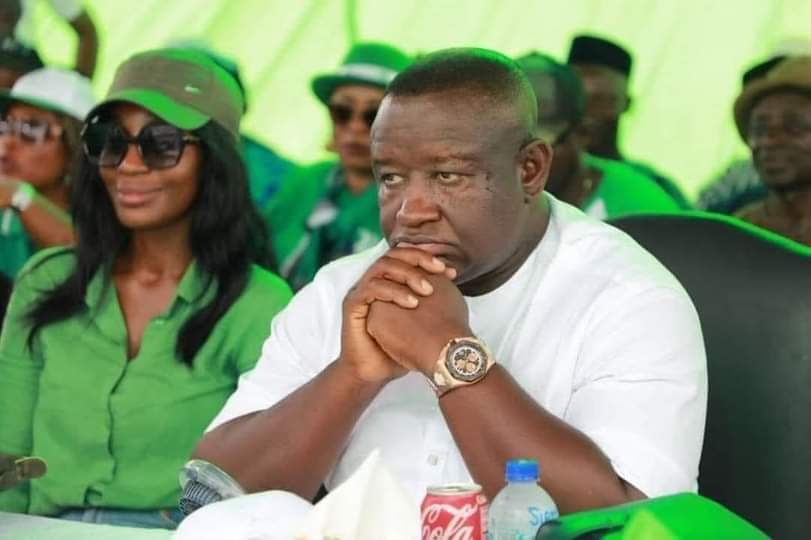In his continuous strive to revamp Sierra Leone mining and aquaculture sectors, Dr. Alfred Seawright, the President and Chief Executive Officer of Seawright Mining Company for the fourth times has sponsored another set of eight-man delegation to study Ghana Aquaculture Development.
The purpose of the tour is for them to learn some new technologies in the area of fish feed formulation, production, fisheries management, and machinery.
The delegation comprises of students, entrepreneurs, lecturers from Njala University, the leading institution for aquaculture development in Sierra Leone and ministry officials.
The head of delegation, Head of Department for Aquaculture and Fisheries Management who is also the Technical Coordinator for Dr. Seawright RAS, Dr. Matthew D. Kpundeh described the impact of the tour as a very great one as the team came from diverse areas such as the private sector, students, lecturers and ministry officials.
He pointed out that those that have small scale production in fish farming, Dr. Seawright wants them to see what it entails in other countries and how other people have masters the technology and for them to take the experience back home and use it to develop their own sector.
He disclosed that going back home, they will take what they have learnt to their respective institutions by training others in order to boost the food security drive the government of Sierra Leone wants to embark on.
Dr. Kpundeh went on to say that Njala University is very happy to be the leading Aquaculture institution in Sierra Leone through the support of Dr. Seawright and that they have the most expensive Aquaculture technology in the country and the region at large.
“We have seen and explore other areas. We will also try to improve on our productions in terms of feeds. We have also learnt what the Ghanaians are doing by using the lake which is a good technology,” he said.
He expressed hope that the government will be very happy to know that a private investor sponsored such a trip individually in order to boos government’s food security drive.
“We have created the connection and networking and we will cascade the message and engage the government to see that we follow the footsteps of Ghana in order to boost our products, research and service delivery so that our farmers can be very much happy and be interested in producing feed for themselves and the general public,” Dr. Kpundeh stated.
Dr. John Paul Kaisam, Senior Lecturer and Acting Dean, School of Basic Sciences, Njala University, thanked Dr. Seawright for supporting such an eye opener trip.
He stated that soon they will kick start similar project, and that they will work based on what they have learnt which will help them to get things right.
He spoke about conducting free training for farmers as the impact will be great so that they will do the correct processing of their fish from farm to fork.
Dr. Kaisam described fish farm as a business that is great and lucrative.
He highlighted some of the places which they visited that are combining fish and poultry in their farm and the huge impact they are making in their communities.
Pilot Aquaculture Centre, Kona – Odumasi, Principal Manager Gabirel Obeng Manu, explained the history behind the establishment of the centre which he said is mainly for the production of fingerlings as their main mandate.
He pointed out that Fish farming is worth embarking on but noted that is it not all fish farming that is fish farming, as some lack the basic requirements.
He furthered that Aquaculture can work when one knows all the nitty-gritty in terms of management so they can do the necessary management to farm.
“If you want to go into fish farming you have to seek for proper advice. You have to know your market needs as well,” he said.
He emphasised that not all waters are for fish farming.
“Before you go into Aquaculture try to seek for information from the right institution and get fingerlings from a reliable source,” Mr. Manu advised.
The visiting team learnt that buying feeds from outsiders is more expensive as feeds play a very important role in fish farming.
The team witnessed first-hand incredible strides Ghana is making in sustainable Aquaculture, from innovative Fish Farming techniques to community-based initiatives, backed-up with Government willingness; they were blown away by the commitment to responsible practices.
Aminata F. Kandeh, CEO, Agro Fish Farm, described the trip as a life-changing journey as she explored Ghana’s thriving aquaculture sector.
She said collaborations are key to driving positive change, and they’re excited about the potential for future partnerships.
“This journey is just the beginning, I am committed to share the knowledge gained and explore ways our organization can contribute to sustainable development, both locally and globally,” she said.
Among the areas the team visited are: CCT Group Limited, the team had a fruitful deliberation with top Cycle Farm manager at the Heavy Industrial area, Tema, the Commercial Director of Raanan Fish Feed West African Ltd took the team on a tour of the feed factory and also a visit was made at the showroom at Accra-Central, the team also visited the Bio Flux Farm to be fully educated about greenhouse Bioflex system, the team visited the Pilot Aquaclture, a home of Tilapia fingerling production, training and internship centre in Kumasi, the team also visited Jannika Organic Agro Business Ltd, an integrated Aquaculture and Poultry production in Kumasi.
The team met with the coordinator of the Centre for Capacity Building and Innovation at Kwame Nkrumah University of Science and Technology in Kumasi.
The catfish breeding center in Kumasi also hosted the team, Dr. Magna at Aquaculture, Research Development Center at Akosombo Fish Farm at Volta Lake and Issachar Lamino, Founder and CEO of Romilla Farm tour with the team across Ghana.












